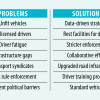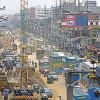HC presses for road safety
The High Court (HC) ordered the government to implement 28 guidelines by a seven-member expert committee formed under a court order designed specifically to reduce road accidents and traffic jams. The ruling puts the responsibility squarely on authorities to implement a wide range of measures that would greatly reduce the high casualty and injury rate people suffer as a result of accidents on highways. According to the World Health Organisation, that figure stands at around 21,000 per annum.
The government had, on earlier occasion, banned 3-wheelers from highways, but the drive against errant drivers of such vehicles sputtered out after a few weeks. The question then is why take a decision which is only going to be implemented half-heartedly. We thank the HC for stepping in to address vital issues of road safety. However, these are steps that should have been taken by relevant bodies of the government and existing rules ought to have been implemented without making it necessary for the HC to step in.
The series of measures spelled out by the HC like raising penalties for law breakers, making it mandatory for drivers of long distance vehicles to carry valid permits while possessing a certain level of education are all enforceable under existing laws or laws that are being amended. The issue of putting up or removing barriers that hinder visibility or cause obstructions to free movement of fast moving vehicles on roads should go a long way in addressing the nagging problems of safety. We certainly hope that the recommendations are implemented without delay.

 For all latest news, follow The Daily Star's Google News channel.
For all latest news, follow The Daily Star's Google News channel. 








Comments